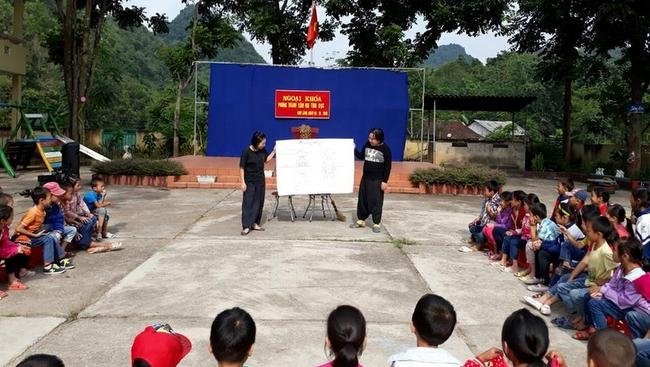
LifeArt Vietnam, a social organisation, has co-ordinated with several primary schools in the northern mountainous province of Cao Bang, to create dramatic plays on child sexual abuse prevention, in which students directly join in as actors and actresses.

A programme of
interactive drama on child abuse in Cao Bang province's Quang Uyen district
The idea of organising volunteer programmes with interactive
dramas which help children improve their knowledge and skills on preventing
sexual abuse was formed in 2017. Three programmes have been held in October in
Dong Da, Nhu Lang and Lung
Luong Primary
Schools in Quang Uyen district. They featured the
participation of around 350 students.
A hypothetical scenario was set up by
teachers from the Life Art and students were invited to replace the characters
to show-off their own solutions. Following, they evaluated their experience by
themselves.
Principal of Nhu Lang Primary School, Phan Thi Quyen, said
that students directly participate in and analyse situations of risk of sexual
abuse, which parents and teachers rarely mention. They are able to improve
their skills of protecting themselves. The programme is a highly effective,
useful and practical playground for children, she noted.
LifeArt was established in 2010.
Practical community-based classes for both adults and children have been
launched by the centre, in co-ordination with social groups, organisations and
schools.
According to the centre’s Director Dang
Minh Thu, the scenarios were inspired by real stories in society. The
programmes help students raise their awareness of protecting personal body
parts and learn ways to escape from people who commit unsafe behaviour with
them. Most importantly, the interactive dramas offer great opportunities for
them to talk openly about this topic and experience solutions that they come up
with.
Interactive drama is not a strange form
of communication in the educational environment in Vietnam. Since the 2000-2008
period, thousands of students in Hanoi and Nghe
An province have taken part in interactive dramatic plays through a project on
reproductive health education launched by the World Population Foundation, the
Vietnam Stage Artists Association and David Glass Theatre (London,
the UK).
joining interactive plays, students can
initiatively handle the situations and learn defensive skills instead of
passively receiving knowledge. It is the hope that such programmes will be
launched more widely and attract the participation of more people, contributing
to the fight against child sexual abuse.
Source: NDO
More than just an information technology teacher, Bui Van Nien is an inspiring figure who has nurtured the scientific curiosity and creative spirit of students in Vietnam’s ethnic minority communities.
Da Bac is the most disadvantaged mountainous district in Hoa Binh province, with ethnic minorities accounting for about 90% of its population. Over the past years, the district has mobilised resources to implement ethnic policies to improve the quality of life of local people.
In recent years, Hoa Binh province has consistently prioritised the protection, care, and education of children, particularly those from ethnic minorities and disadvantaged backgrounds, by creating a safe, healthy, and nurturing environment for their all-round development.
The Steering Committee for Tobacco Harm Prevention and Control of Hoa Binh province, in coordination with the Tobacco Harm Prevention and Control Fund, held a ceremony on May 28 in response to the World No Tobacco Day (May 31) and the National No Tobacco Week (from May 25 to 31). The event was chaired by Nguyen Van Toan, Standing Vice Chairman of the provincial People’s Committee and head of the Steering Committee.
Since 2021, the Center for Industrial Promotion and Industrial Development Consulting (CIIDC) under the Department of Industry and Trade has been implementing a school lighting model as part of the plan for using energy efficiently and economically in Hoa Binh Province in the pẻiod of 2021 - 2025. This model not only aims to improve the learning conditions and enhance the education quality, but it also promotes the message of energy saving, energy security, environmental protection and contributes to the goals of socio-economic development.
In the 2024 - 2025 school year, the entire Hoa Binh provincial education sector includes 520 educational institutions and schools. Among them are 13 ethnic boarding schools with 153 classes and 4,487 students. Four of these schools have met national standards, reaching 30.7 percent.



